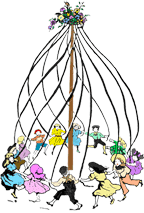Early Dramatics
Following the strong inclinations for the spoken drama expressed by the pioneers of Utah, the settlers of Cache Valley took an active interest in dramatics along with their schools and religious meetings. Even during the first winter of 1860, provision was made in the little log school and meeting house on Center Street for entertainments. The strenuous times made it necessary for the people to have diversion and entertainment and during those long winter months the drama was one of the principal means of giving this. A small stage was made and later some scenery with wings was painted.
Mr. Richard Evans took much interest in the drama and helped to train the players, conduct the plays and interest the people. William Goodwin, Charles Goodwin, Jacob West, Mr. and Mrs. Benjamin Cluff, Joseph E. Hyde, Moses Thatcher, T. B. Cardon, Joseph Foster, Alex Allen, David Crockett, Maria Cowley, Marie Ballif, James H. Martineau, were some of the early ones who took parts in the little plays. "No Doubt," “Ingomar,” “Midnight Angel,” “Charcoal Burner,” “She Stoops to Conquer,” “Damon and Pythias,” which were some of the first plays, will be familiar to a number of the early settlers.
The “Old Hall” located on the corner of Main and First North, now known as the Howell Block, was dear to the hearts of all the old settlers. It was in this building that every entertainment occurred for years, enjoyed by the people. It was here where the drama flourished in that early day.
Other players at that time were Edward Crowther, Cmma and Bell Benson, Edward Hawa, Letitia Haws, George Bywather, Joe Bywather, John Smith and John Wilson. Many will recall the plays, “Enoch Arden,” “Parthenia,” “Ben Bolt” and plays of Shakespeare. At a later date plays were staged in the Reese Hall on Center Street.
With the completion of the Thatcher Bank Building in 1889, one of the finest opera houses in the west, known as the Thatcher Opera House, was built. It was far in advance of the city and was really commensurate for cities with a much greater population and wealth. It became one of the seats of culture in the city and was a monument to its builders. Many high class shows and entertainments were staged there among which were, “Mendelssohn Company,” “Donovan’s Tennesseans,” New York Symphony Club, Eckert Opera Company, Innes Band, Kate Castleton with her performance, “The Dazzler,” Katie Putnam and Patti Rossi in “Gloriana” and “Niobe” and “Kajanka;” the “Stowaway” sent out by Frohman and others brought many thrills to the theatre going people. One of the most popular local productions was that staged by the Black Mantels Opera Company.
Mr. George W. Thatcher, Jr. was the manager of the Thatcher Opera Company and much credit was due him for the care and enterprise he exercised in booking only first class companies. He was successful in getting his house on Frohman’s Theatre list. Recognition form Mr. Frohman was a distinct compliment to the Thatcher Opera Company and Mr. Thatcher as manager.
In 1912 a most disastrous fire started in the Thatcher Building and the Opera House, being a part of the structure, was completely destroyed.
